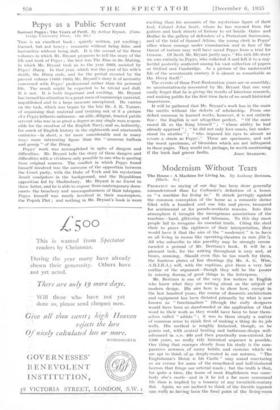Pepys as a Public Servant
Samuel Pepys The Years of Peril, By Arthur Bryant. .(Cam- bridge Uzdvorsity Press, • 12s. 6d.) ; .
'rim is an excellent book : quietly written, yet exciting ; learned, but. not heavy ; romantic without being false, and instructive without being dull. It is the second of the three volumes in which Mr..Bryant proposes to tell the, story of the life alid.Work of Pepys the first Was . The Man.,in the-Making,. in which Mr. Bryant took us to the year. 1069; assisted by Peps's' Diary. In that year, which was the year of his wife's death, the Diary ends, and for the period. covered by the present volume (1669-1688) Mr. Bryant's story is of necessity concerned with Pepys' professional rather than his personal life. The result might be expected to be trivial and dull. It is not. It is both important and exciting. Mr. Bryant has turned his attention to a great mass of manuscript material, unpublished and in a large measure unexplored. He carries on the task, which was begun by the late Dr. J. R. Tanner, of Organising that material and creating out of it a picture of a Pepys hitherto unknown—an able, diligent, trusted public servant who was in as great a degree as any single man respon- sible for the creation of the English Navy; and so, indirectly, for much of English history in the eighteenth and nineteenth centtiries—in short, a far more considerable and in many ways more interesting figure than the t' amorous buffoon and gossip " of the Diary.
-Pepys' work was accomplished in spite of dangers and difficulties. Mr. Bryant tells the story of these dangers and difficulties with a vividness only possible to One who is quoting from' original sources. The conflict in which Pepys found himself involved was the outcome of the opposition between the Court party, with the Duke of York and his mysterious Jesuit coadjutors in the background, and the Republican opposition led by Shaftesbury. Mr. Bryant is no friend to these latter, and he is able to expose from contemporary docu- ments the treachery and unscrupulousness of their intrigues. Pepys himSelf was nearly involved in their masterpiece, the Popish Plot ; and nothing in Mr. Bryant's book is more
L
exciting than his accounts of the mysterious figure of their tool, Colonel John Scott, whom he has rescued from the gutters and back streets of history to set 'beside Oates and Bedkie In the gallery of defenders of a Protestant Succession, and of the trial of Samuel Atkins, the young clerk in Pepys' office whose courage under examination and in face of the threat of torture may well have saved Pepys from a trial for treason. . Of Scott Mr. Bryant justly says, "His rich life-story we owe. entirely,,to.,Pepys, who collected it and left.it to a neg- lectful posterity scattered among his vast collection of papers at Oxford and Cambridge. As a picture of the underworld life of the seventeenth century it is almost as, remarkable as the Diary itself." ,.
The events of these Post-Restoration years are so smoothly, so unostentatiously recounted by Mr. Bryant that one may easily forget that he is giving the results of laborious research, and making public for the first time facts of no small historical importance.
It will be gathered that Mr. Bryant's work has in the main the merits without the defects of scholarship. From one defect common in learned works, however, it' is not entirely free : the English is not altogether perfect. " Of the same moral ilk as the King himself " ; " whose ability he had already apprised " ; " he did not only love music, but under- stood its niceties " ; " who imposed his eyes to almost as severe a. strain as Pepys'." These are specimens, and not the worst specimenS, of blemishes which; are not infrequent in these pages. They would not, perhaps, be worth mentioning












































 Previous page
Previous page